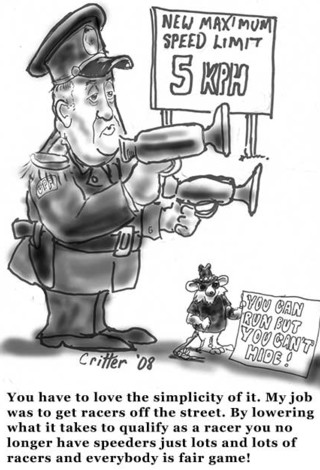This article speaks volumes about the Liberal party in Ontario
By LORRIE GOLDSTEIN, The Toronto Sun
Last Updated: 10th May 2009, 3:49am
If a gaffe is defined as a politician mistakenly saying what he really thinks, I'd argue Ontario Liberal cabinet minister Michael Bryant committed a huge gaffe last week.
It arose out of a bizarre speech he gave to the Canadian Club on Monday, in which the economic development minister -- a lawyer by training representing a downtown Toronto riding -- waxed enthusiastically about the need for governments to invest billions of taxpayers' dollars into those businesses they deem "winners," as opposed to "losers," on a "company by company" and "industry by industry" basis.
Asked later about Bryant's idea of the state as, to use his phrase, the "uber-entrepreneur," Premier Dalton McGuinty backed away, but only slightly, saying while supporting businesses on a "company by company" basis was extreme, supporting "particular sectors" of the economy was wise public policy. (And indeed, already widely accepted practice .)
But there was another observation Bryant made in passing which received far less attention, but which to me, provided much greater insight into his thinking on this issue.
At first blush, it may seem out of place in a speech by an economic development minister to a largely business audience in Toronto, but, as you'll see below, I don't think it is at all, considering the modern "liberal" political tradition from which Bryant appears to come.
What he said was: "It's preposterous to imagine that government in this century or the last century is not the most impactful institution in our day-to-day lives, outside of the family," as part of his justification for making the state society's "uber" or ultimate entrepreneur. (Which, to an increasing extent, it is, regardless of whether "Liberals" or "Conservatives" are in charge.)
In other words, since, save for the family, the modern liberal state has more impact on individuals (i.e. "in our day-to-day lives") than anything else, it's a logical and just extension of the state's power that it should use public money to pick which businesses succeed and which fail in the marketplace, for the greater social good.
But I'd argue Bryant is actually underselling the activist role of the modern liberal state as he and those who share such views envision it. I'd suggest what they really believe is that the modern liberal state -- guided by wise elites such as themselves -- should take precedence over the family, in the pursuit of what they conceive is the greater social good.
In that sense, Bryant's theory of the modern liberal state as the "uber-entrepreneur" is only part of the equation.
Universal daycare is another -- the state as the "uber" parent.
To understand this aspect of the modern liberal mind (as opposed to classical liberal thinkers who were primarily concerned about the rights of the individual, not the power of the state) we can look to what I suggest is another gaffe by a modern liberal thinker.
That was Scott Reid, then a powerful aide to prime minister Paul Martin, who, in the 2006 federal election, blurted out during a talk show that the problem with Stephen Harper's plan to give parents back a small amount of their own money to help them deal with the costs of raising their own children, was that parents would just -- his words -- "blow" it on "beer and popcorn," compared to the advantage of leaving that money (and perhaps more) with the state, to let it provide for the daycare needs of infant children. (Reid, of course, immediately apologized for his gaffe.)
For those inclined to explore such issues and their implications for society, I highly recommend The Liberal Mind -- The Psychological Causes of Political Madness -- by Dr. Lyle H. Rossiter, Jr., an MD and general and forensic psychiatrist, who has testified as an expert in thousands of American civil and criminal cases.
Rossiter argues modern liberalism leads to political madness, because it seeks to override the individual's psychological need for freedom, in the name of social engineering.
As Rossiter diagnoses it: "This bias is destructive to the ideals of liberty and social order and to the growth of the individual to adult competence.
"Instead of promoting a rational society of competent adults who solve the problems of living through voluntary co-operation, the modern liberal agenda creates an irrational society of child-like adults who depend upon governments to take care of them. In its ongoing efforts to collectivize society's basic economic, social and political processes, the liberal agenda undermines the character traits essential for individual liberty, material security, voluntary co-operation and social order."
Sound like anyone we know?
LORRIE.GOLDSTEIN@SUNMEDIA.CA
Tuesday, May 12, 2009
Subscribe to:
Post Comments (Atom)
They had No Choice!

They wore these or I took away thier toys for 7 days!
"Damn Street Racer"pays with Brusies


















No comments:
Post a Comment